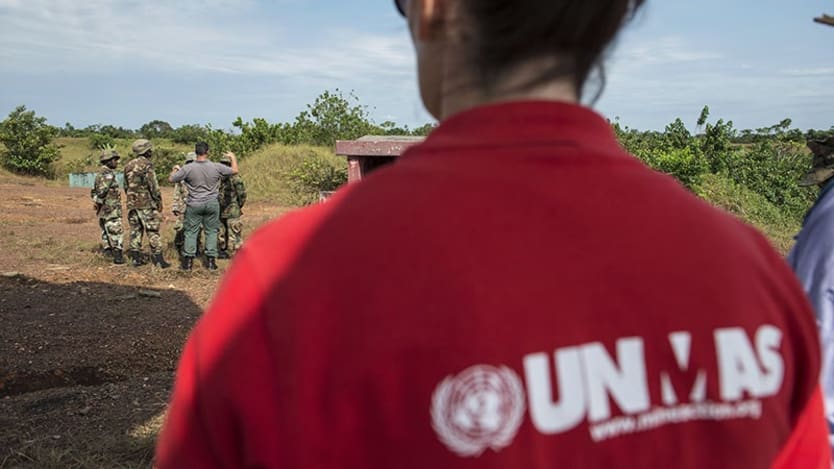
LONDON — Despite promises to improve the work environment at the United Nations Mine Action Service amid long-running allegations of bullying and harassment, staff say things are worse than ever at the demining agency.
Staff at the U.N. body, which helps clear minefields and improvised explosive devices, have long complained about the atmosphere under Director Agnès Marcaillou, describing a culture of “fear, public humiliation, and intimidation.” The French national has been in charge of UNMAS since 2012, but sources say she has been subject to complaints of bullying through various U.N. channels during that time.
Exclusive: UN demining agency rocked by bullying allegations
Devex reveals allegations of years of bullying and harassment at the UN Mine Action Service.
Last May, Marcaillou’s boss, Assistant Secretary-General for Rule of Law and Security Institutions Alexandre Zouev, launched a 14-month action plan to improve the situation, including management coaching, a potential restructuring, and an independent “fact-finding investigation panel” to look into all existing complaints.
Nearly one year into the plan, however, UNMAS staff say little has changed and that a “toxic culture” still pervades the agency. Marcaillou remains in place, and although the department has a new deputy director in an effort to shake-up the management structure, insiders say her appointment has led to explosive power struggles.
“The majority of us at UNMAS were hopeful that our senior leadership would finally take action to address the toxicity of our daily work environment … [but] no substantial management reforms have been implemented and staff-management relations at UNMAS have worsened significantly,” a group describing themselves as “whistleblowers” wrote to Devex.
In January, the U.S. reversed its prohibition on the use of landmines.
—The message accuses senior leadership of failing to protect staff from retaliation and of “damaging an organization that we love and whose work is indispensable.”
The problems at UNMAS come at a sensitive time for the demining community, which was left reeling by the United States’ decision to reverse its 2004 prohibition on the use of landmines. The move, announced in January, threatens progress toward the campaign for a landmine-free world by 2025, experts warn.
“The sector looks to UNMAS for leadership and coordination on landmine issues worldwide and for that to be effective, UNMAS needs to be seen as united,” a senior professional working in the demining sector, who asked for anonymity to preserve professional ties, told Devex. “This sort of infighting, which is an open secret in the sector, is damaging to everyone.”
Lack of action
Zouev announced his 14-month action plan in May 2019. According to an email he sent to staff at the time, a key part of it would involve “coaching of targeted colleagues, teambuilding exercises, and access to additional training including on harassment, gender sensitivity, and emotional intelligence.”
However, this training has been postponed at least twice, with no explanation, UNMAS insiders said. The last postponement was announced in January, the day before a two-day training for secretariat staff in New York was due to start, by which time staff had flown in from Geneva, wasting thousands of dollars, sources said.
A U.N. spokesperson told Devex in an email before the COVID-19 pandemic that the training had been postponed for “technical reasons,” and would be held in the first half of 2020. Later, as travel shut down, they added that it would happen “as soon as the COVID-19 pandemic situation allows.”
Unhappy staff also raised questions about the independence of the fact-finding investigation, of which they are yet to hear the outcome, and said they fear retaliation from Marcaillou if she discovers the identity of those who have complained about her.
Another element of the action plan was a potential “restructuring [of] the Service to ensure a sound management structure that is fully fit for purpose.” In July, Zouev announced that a new deputy director position had been created within UNMAS and that Ilene Cohn, who had previously worked for him in the Office of the Assistant Secretary-General, had been given the role.
But some staff say that Cohn’s presence has made the situation at UNMAS worse, with reports of “screaming matches” and “power struggles” between her and Marcaillou and confusion over who staff should report to.
Finally, Zouev also promised to review UNMAS’ partnerships. Last year, he commissioned an independent review of the agency’s relationship with the United Nations Office for Project Services, which has been UNMAS’ implementation partner for the past 25 years. The partnership came up for renewal last year and negotiations are still ongoing. In the meantime, the existing agreement has been “temporarily extended,” a U.N. spokesperson said.
Insiders say Marcaillou has long been unhappy with the relationship, fearing conflicts of interest and divided loyalties among UNMAS staff who are employed on UNOPS contracts, which is the majority of the agency’s field staff. However, the independent review, seen by Devex, disagreed and warned that attempts to change the “currently well-functioning” arrangement could have negative consequences for UNMAS’ work.
Staff say the dispute with UNOPS is another example of UNMAS senior leadership putting their own agendas ahead of the agency and its staff.
Marcaillou, Cohn, and Zouev all declined to be interviewed for this story. However, in a statement emailed to Devex, Zouev said:
“UNMAS undertakes life-saving work in some of the world’s most dangerous places to rid the world of landmines and explosive remnants of war and improvised explosive devices … Ensuring that our staff work in a harmonious workplace, in a culture of clear and open communication is critical. I am fully committed to taking all the necessary actions towards meeting this goal.”


